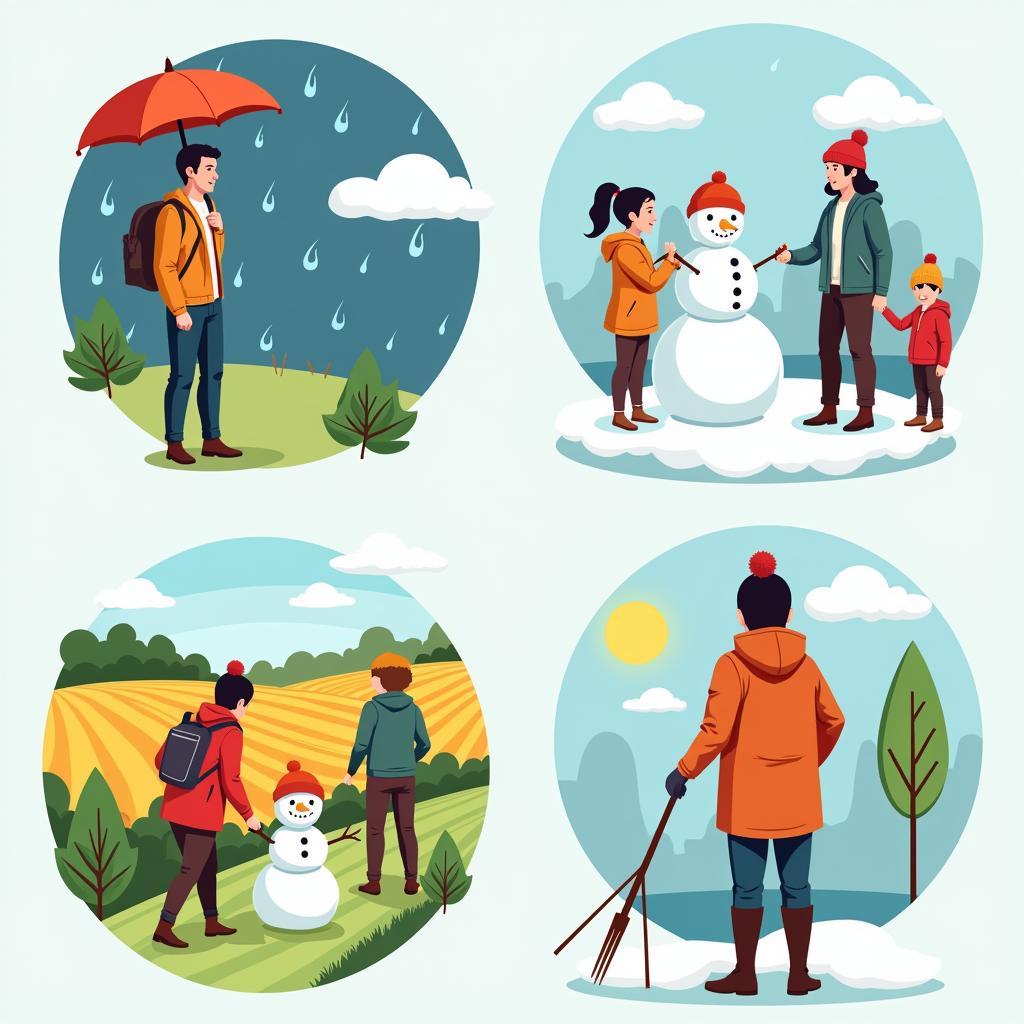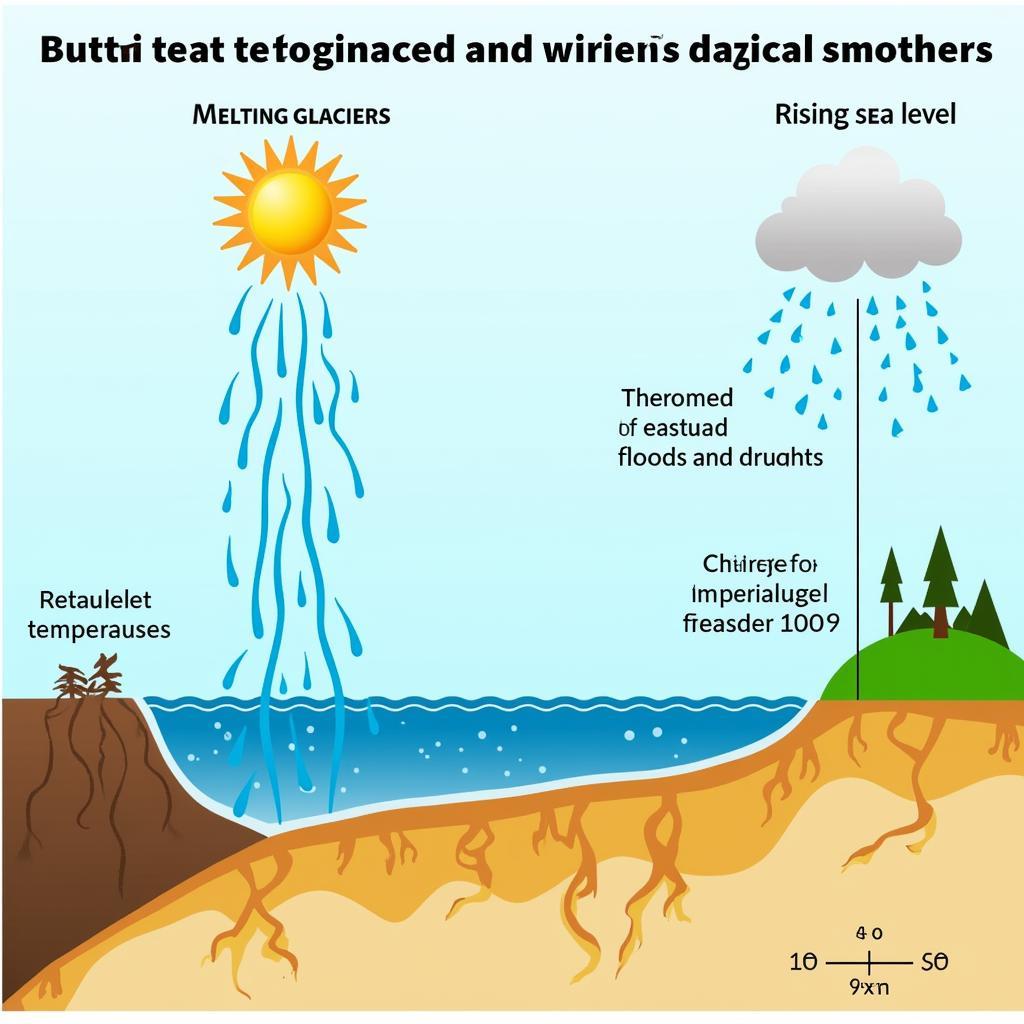Talking about the weather is a common topic in the IELTS Speaking test, especially in Part 1. However, in Part 3, the examiner will delve deeper into your ability to discuss more complex and abstract ideas related to weather and climate. Understanding how to effectively navigate these conversations is key to achieving a higher band score.
It’s important to remember that IELTS Speaking Part 3 isn’t just about giving simple answers. The examiner is assessing your ability to express complex ideas, justify your opinions, and engage in a thoughtful discussion. So, while discussing something seemingly simple like the weather, you need to showcase a wider range of vocabulary and grammatical structures. Prepare to discuss various aspects of weather, from its impact on daily life and the economy to climate change and future weather patterns. You might be asked about the role of technology in weather forecasting, or even the cultural significance of weather in different societies.
How Does Weather Influence People’s Daily Lives?
Weather plays a significant role in shaping our daily routines. From choosing our clothes to planning outdoor activities, we constantly adapt to the prevailing weather conditions. Consider the impact of extreme weather events, such as heavy rain, snowstorms, or heatwaves. These events can disrupt transportation, affect agriculture, and even pose threats to our safety and well-being.
 Ảnh hưởng của thời tiết đến đời sống hàng ngày
Ảnh hưởng của thời tiết đến đời sống hàng ngày
Furthermore, weather patterns can significantly influence our moods and emotions. Sunny days often uplift our spirits, while gloomy weather can sometimes make us feel down. Discussing these nuanced effects can demonstrate your understanding of the multifaceted nature of weather’s impact. Preparing for questions like these by considering personal anecdotes and observations can make your responses more engaging and genuine. For example, you can talk about how IELTS Part 1 sample questions related to daily routines can be linked to weather conditions.
Discussing Climate Change and its Effects
Climate change is a pressing global issue, and the IELTS Speaking test often includes questions related to its impact. Be prepared to discuss the causes and consequences of climate change, as well as potential solutions. You might be asked about the role of individuals, governments, and international organizations in mitigating climate change. Expressing informed opinions on these topics is crucial for demonstrating your ability to engage with complex issues. You can also draw parallels between the current weather patterns and long-term climate trends, demonstrating a deeper understanding of the subject.
 Biến đổi khí hậu ảnh hưởng đến thời tiết
Biến đổi khí hậu ảnh hưởng đến thời tiết
Furthermore, discussing the economic and social consequences of climate change can further showcase your analytical skills. For instance, you can talk about the impact on agriculture, tourism, and human migration. It’s important to be well-informed about current events and scientific findings related to climate change to effectively address these questions. This also connects to broader environmental concerns, which you might have encountered in IELTS speaking environment questions.
The Future of Weather Forecasting
Technology plays a crucial role in weather forecasting, and this is another area that might be explored in Part 3. Discuss the advancements in weather prediction technology, such as satellites, radar, and computer models. You can also talk about the limitations of current forecasting methods and the potential for future improvements. For example, consider the role of artificial intelligence and machine learning in enhancing weather prediction accuracy.
 Dự báo thời tiết công nghệ hiện đại
Dự báo thời tiết công nghệ hiện đại
Reflecting on how weather forecasting has evolved over time can demonstrate your ability to analyze historical trends and project future developments. Remember to back up your points with examples and evidence to support your claims. Understanding the impact of accurate weather forecasting on various sectors, such as agriculture, transportation, and disaster preparedness, is also crucial. This also ties into the general conversation starters, like those explored in how are you today ielts.
Conclusion
Successfully navigating IELTS Speaking Part 3 questions about weather requires more than just knowing basic weather vocabulary. It’s about demonstrating your ability to think critically, express complex ideas, and engage in a meaningful discussion. By preparing for a range of potential questions and practicing your speaking skills, you can confidently approach this section of the test and achieve your desired band score. Remember to practice using linking words for IELTS speaking part 2 which can also be applied effectively in Part 3.
FAQ
- What kind of weather-related questions can I expect in IELTS Speaking Part 3?
- How can I improve my vocabulary related to weather and climate?
- How can I express my opinions effectively on complex issues like climate change?
- What resources can I use to prepare for IELTS Speaking Part 3?
- How important is it to use specific examples in my answers?
- What are some common mistakes to avoid when discussing the weather in IELTS Speaking?
- How can I connect the topic of weather to other related topics in the IELTS Speaking test?
Mô tả các tình huống thường gặp câu hỏi.
Các câu hỏi trong phần này thường xoay quanh tác động của thời tiết đến đời sống, biến đổi khí hậu, dự báo thời tiết và các vấn đề liên quan. Bạn có thể được hỏi về ảnh hưởng của thời tiết đến nền kinh tế, văn hóa, du lịch, hoặc thậm chí là tâm trạng con người.
Gợi ý các câu hỏi khác, bài viết khác có trong web.
Bạn có thể tìm thấy thêm thông tin hữu ích về IELTS Speaking tại các bài viết ielts material speaking part 1 2019.





